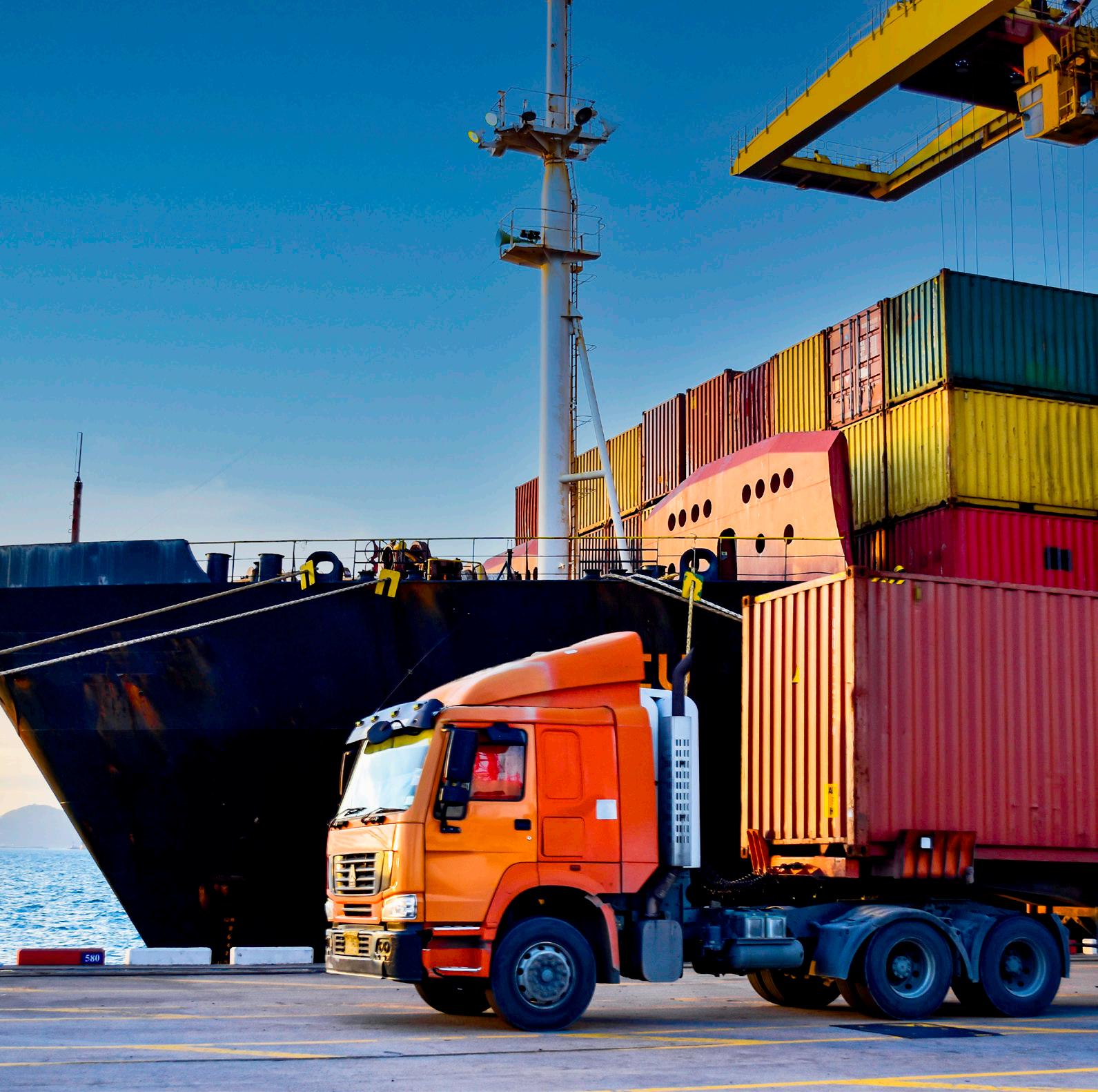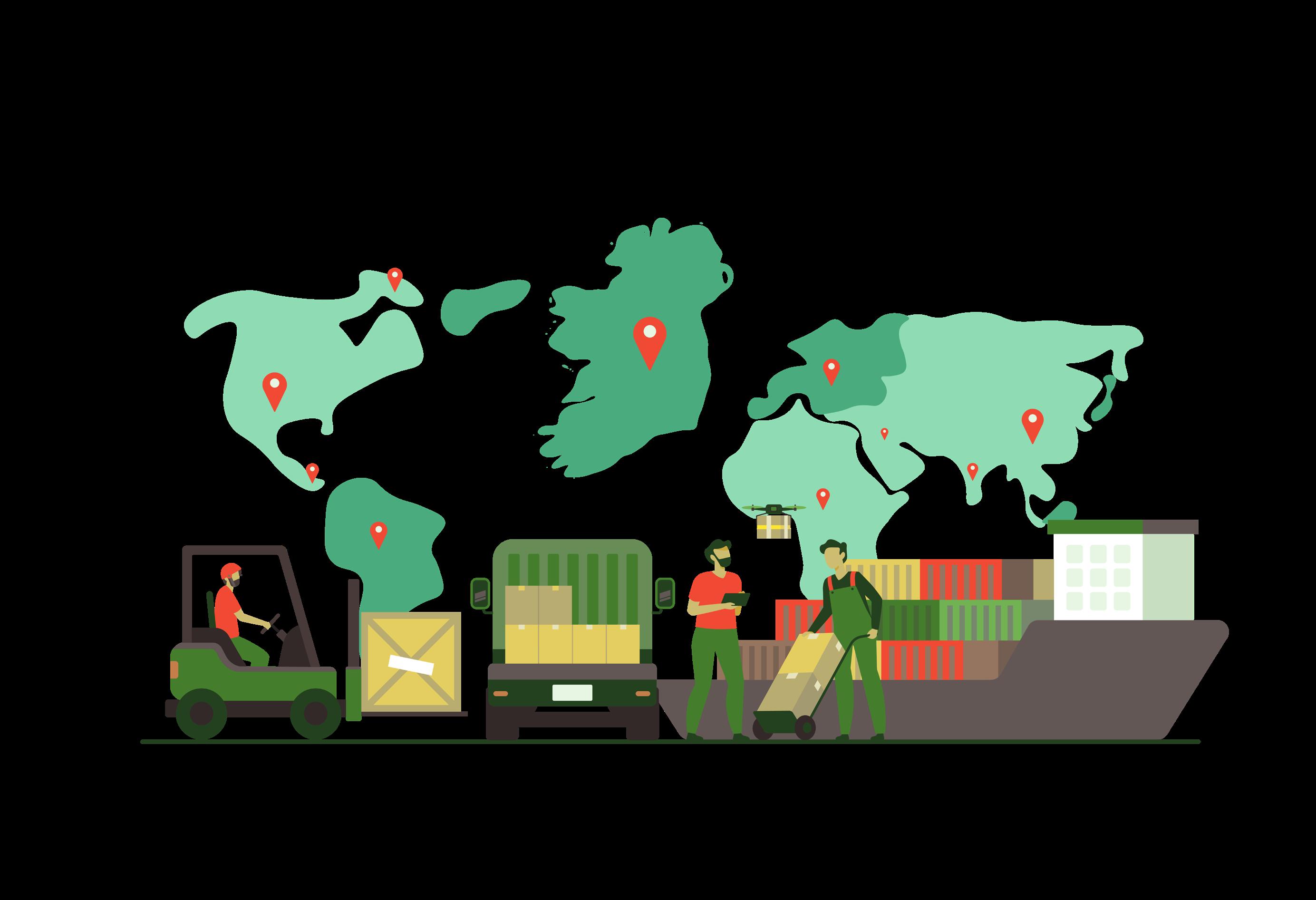

Supply Chain & Logistics


The urgent case for a state-backed export credit insurance scheme
Ireland is one of Europe’s most open and globalised economies, yet it remains one of the few EU member states without a statebacked export credit insurance scheme.
This absence of a state-backed credit insurance scheme leaves Irish exporters, particularly SMEs, at a disadvantage compared to their European peers.
Engineering Industries Ireland (Ibec), a representative of Irish business, has consistently called for the introduction of such a scheme. In today’s climate of geopolitical risk, supply chain reconfiguration and intensified global competition, that call has become more urgent than ever.
Why export credit insurance matters
Export credit insurance is a financial safeguard that protects businesses from the risk of non-payment by international buyers, due to reasons ranging from commercial insolvency to political instability.
In most EU member states, national Export Credit Agencies (ECAs) provide this essential cover, enabling exporters to expand into higher-risk markets with confidence. Ireland, however, relies solely on private insurers, which are often risk-averse and operate within narrow limits. For Irish engineering exporters and growing SMEs, this limitation is increasingly untenable.
Political awareness but limited progress
In a recent positive move, the Government’s Action Plan on Market Diversification, published in August, directed Enterprise Ireland to research a potential scheme and bring forward proposals by the end of 2025. Supports are available through Enterprise Ireland and the Strategic Banking Corporation of Ireland. However, these do not address the political and commercial risks that ECAs in countries such as Germany, France and Denmark already cover.
A strategic imperative
The absence of state-backed credit protection could result in difficulty securing working capital when coverage is unavailable, restricted access to higher-growth emerging markets and weaker competitiveness against European firms with ECA support. These challenges hold back some of Ireland’s most innovative and exportready companies. Therefore, a statebacked export credit insurance scheme in Ireland is strategically essential. It is time for Ireland to align with the rest of Europe and provide its exporters with the risk tools they need to thrive on the global stage.


Shaping the future of a greener, smarter sector
As Ireland gears up for its fourth annual Logistics and Supply Chain Skills Week (16–23 April 2026), we stand at the crossroads of opportunities and challenges.

This skills week continues the national effort to spotlight the vital role the sector plays in the Irish economy while carving out a pathway to a more sustainable and technologically advanced future.
Logistics and Supply Chain Skills Week
This sector is a cornerstone of Ireland’s economy, supporting billions in exports and employing over 100,000 people. Yet, it faces critical challenges: an ageing workforce, a shortage of digital and green skills and the need to attract a more diverse talent pipeline. Logistics Week aims to bridge these gaps by promoting career pathways, showcasing educational opportunities and fostering connections between employers and potential employees.
This skills week is about changing perceptions, attracting young people and encouraging more women to consider careers in logistics — this vital sector keeps our country stocked and moving.
Demands for digital expertise Decarbonisation and digitalisation must intertwine with workforce development. Logistics Week signifies our collective dedication to creating sustainable supply chains that foster economic resilience and uphold environmental responsibility.
The sector faces increasing demands for digital expertise — such as AI, automation and data analytics — and
sustainability skills to meet climate targets and adapt to new regulations. As global supply chains become more complex and customer expectations shift, a workforce equipped with advanced skills is crucial for maintaining competitiveness, driving innovation and securing international investment.
Tackling skills shortages through development
Skills shortages are evident, particularly in supply chain management, digital technologies and green practices. With 31% of HGV drivers aged 55 or older and persistent gaps in digital and sustainability roles, the sector risks bottlenecks and missed opportunities if it does not invest in talent.
As businesses integrate new technologies and transition to lowcarbon operations, roles are being redefined. Prioritising future skills development will help the sector build resilient, sustainable supply chains and reinforce its position as a global leader in trade and innovation.
Participate in supply chain resilience efforts
I’m calling on businesses across the sector to get involved and make a lasting impact. Whether you’re a multinational logistics provider, a local haulier, a warehouse operator or a tech innovator in supply chain solutions — your participation is vital.
Lead: Henry Phillips All images supplied by Getty Images, unless otherwise specified | Contact information: ie.info@mediaplanet.com or +44 (0) 203 642 0737
Seán Canney Minister of State, The Department of Transport
Dominique Gouveia Policy Executive, Engineering Industries Ireland (Ibec)
How logistics providers can help firms navigate supply chain uncertainty

With the help of their logistics partners, savvy companies can build flexible, scalable and sustainable supply chains that respond to market impacts and evolving customer needs.

Tom Kelly Managing Director, Arvato Ireland

Tracy Burke Business Development Director, Arvato Ireland
We live in an uncertain world — and uncertainty can hit businesses hard. Take supply chains, which are currently under enormous strain due to uncertainty caused by (among other pressures) tariffs, rising fuel prices, high consumer expectations and an urgent clamour for sustainability. That’s why savvy companies are driving supply chain resilience to the top of their agendas in 2025 and beyond.
Need for flexible, scalable logistics solutions Companies must be agile and flexible enough to respond quickly to supply chain disruptions and evolving customer needs, but without compromising performance, quality or sustainability. Yet, it’s not just agility and flexibility that are important, says Tom Kelly, Managing Director of Arvato in Ireland.
“These days, the big requirement is to be scalable because things can change so dramatically and quickly,” he explains. “Look at the tech sector. Because of AI, the demands of big players such as hyperscalers are doubling — and could continue to double in the years ahead. The same thing is happening in other industries. When an unforeseen market impact gives companies a huge growth spurt, they need a logistics partner that is equipped to deal with scalable volumes.”
Ireland is a digital infrastructure powerhouse and home to top hyperscalers. “Our acquisition of ATC Computer Transports and Logistics strengthens our footprint in high-tech logistics, particularly for data centres and hyperscalers and positions us at the heart of this ecosystem, enabling us to deliver critical, high-value logistics services where speed and precision are key,” adds Kelly.
Responding quickly and proactively to change Arvato, a global provider of B2C and B2B supply chain solutions, supports businesses across a wide range of sectors, including tech, healthcare and consumer products.
things change and remaining in close contact with regular strategic reviews and rapid response consultations.”
Using innovation to enhance resilience Digital transformation has been a key ingredient of supply chain resilience. For instance, Arvato’s cloud-based infrastructure increases speed, visibility and control during the picking, packing and shipping process while still ensuring iron-clad security of customer data.
Meanwhile, AI advances are being used to improve the efficiency of warehouses, optimise inventory, monitor performance in real time and proactively manage risks. “If clients have more insightful information about how their operation is working — and what might happen in the future — it will help them add value to their supply chain decision-making,” says Burke.
By listening to the needs of our Irishbased clients, we’re able to develop localised solutions that are bespoke to them.
Great logistics innovations come in every shape and size. “Take warehouse robotics, which allows for high levels of scalability that weren’t necessarily achievable in the past,” says Kelly. “But smaller enhancements, such as wearable tech, can also significantly improve productivity and efficiency.”
Supply chain resilience and sustainability Naturally, today’s businesses must also include sustainability measures in their supply chain resilience strategies. “Sustainability is included in the content of every RFP and RFQ we receive,” reveals Burke. “It’s a real expectation from our clients.”
Sponsored by Arvato

While it runs a network of warehouses with global reach and international teams, it works in a decentralised way. This ‘glocal’ approach gives its ‘in-country’ companies — that know their local landscape better than anyone — more entrepreneurial freedom and flexibility to deliver for the businesses on their doorstep.
“By listening to the needs of our Irish-based clients, we’re able to develop localised solutions that are bespoke to them,” says Tracy Burke, Business Development Director. “Then, it’s about responding quickly and proactively when
Arvato is dedicated to building greener, more responsible supply chains. Its own carbonreducing initiatives in Ireland include onsite EV charging stations, rooftop solar PV systems and 100% renewable energy usage. Following its acquisition, ATC contributes to this effort with a growing fleet of e-trucks for green transport. “We found that investing in more sustainable solutions has been beneficial to our operational results,” says Kelly.
While resilient, sustainable supply chains weather storms more effectively, creating them requires businesses and their logistics partners to work closely together.
WRITTEN BY
Tony Greenway
Digital divide impacts Irish supply chains
As Irish supply chains adopt advanced technology, a growing digital skills gap threatens to leave smaller firms less competitive than larger ones.

Ireland’s supply chain and logistics sector is essential to the economy, carrying around €196 billion in exports annually and handling over 47.5 million tonnes of goods through ports in 2023 (Gov. ie). However, there is a clear digital skills gap. Both government and industry have recognised this and are taking action.
Smart tech strengthens logistics
The Department of Transport’s Logistics and Supply Chain Skills Week 2025 is one example, aiming to promote digital and green innovation in logistics. National strategies, such as Harnessing Digital - The Digital Ireland Framework and the Ireland Industry 4.0 Strategy, encourage greater use of technologies like artificial intelligence, cloud computing and data analytics by 2030 (IrishTimes). Recent global challenges have exposed the need for resilience and efficiency in Irish supply chains. As a result, more companies are adopting digital solutions to increase productivity and flexibility. Leading firms are using AI for forecasting, IoT for logistics, blockchain for traceability and digital twins for real-time data and decision-making.
Tech adoption gap persists
medtech and biopharmaceuticals, have made significant investments in automation and analytics. An IBEC survey shows that 54% of manufacturing firms have adopted AI, compared to the national average of 39% (manufacturingsupplychain.com). In contrast, many small and traditional logistics companies have not kept pace, with lower rates of digital adoption.
High-tech industries, such as medtech and biopharmaceuticals, have made significant investments in automation and analytics.
Partnerships power supply chains
To address this, new initiatives have been launched. The Irish Medtech Association’s Digital Transformation simplified programme provides practical support to accelerate digitalisation. Irish Manufacturing Research delivers larger digital transformation programmes using global best-practice frameworks, such as the Smart Industry Readiness Index, for Enterprise Ireland and IDA Ireland clients. BioPharmaChem’s 2025 consulting strategy prioritises supply chain resilience, talent development, investment and ecosystem collaboration.
While these efforts are positive, more collaboration is needed. Partnerships between large companies and SMEs should be encouraged through subsidised programmes and knowledge sharing. This will help ensure that digital transformation benefits the entire supply chains and supports Ireland’s economic growth and resilience.
Despite progress, there is a growing gap between larger and smaller businesses. High-tech industries, such as

Guillaume Hernoux Digital Transformation Advisor, IMR
